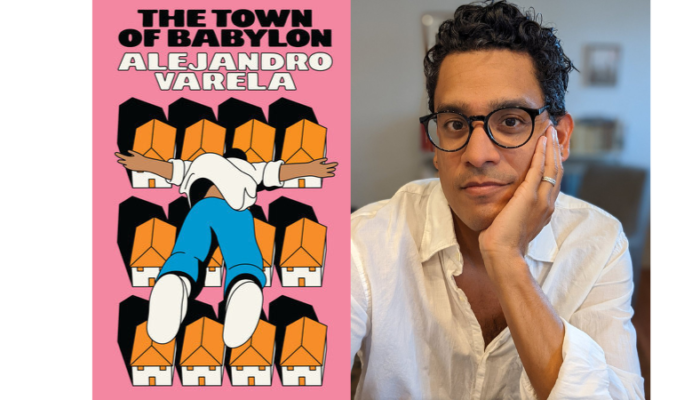James Yeh’s “Your Giant New Loft” appears in Apogee Issue III. The brief story tours the expensive home of a friend you didn’t know had money while exploring class anxiety along the way. I spoke with James about the piece, his writing, and more.
Scott Dievendorf: Part of Apogee’s mission is to publish literature that interrogates the status quo and engages with issues of identity politics. Not all of your work is explicitly political and I wouldn’t necessarily classify you as a political author, though your piece in our current issue certainly speaks to class anxiety. Do you ever feel a personal urgency to explore issues of class, race, or other facets of identity through your fiction? In other words, what are your personal feelings about using literature as means of social inquiry?
James Yeh: That’s a tough question to answer because on the one hand, of course I’m interested in class and race and issues of identity. As the son of Taiwanese immigrants to South Carolina, where I was born and grew up, there isn’t much choice. Questions of race and identity come to you—sometimes at you. That said, I’m less interested in work that strikes me as wholly or essentially polemic either. It’s a hard line to walk, I think, to, as you say, “interrogate the status quo”—while also doing the not-so glamorous work of fiction, which, as Flannery O’Connor says, is about “everything human and we are made out of dust, and if you scorn getting yourself dusty, then you shouldn’t try to write fiction.” What was it that William Carlos Williams said? Through objects ideas? (I just Googled it: “No ideas but in things.”) I like that. Perhaps we can extend it: no politics but in things? And in those, a good many—or none at all?
For instance, in my story in Apogee, I’m fascinated by the gigantic condo in the story, the bits of dialogue that the female character uses to justify her decisions to the narrator, and herself. If some larger ideas can be hung on these elements, then great. I would be lying if I said I wasn’t interested in the implications of details or pieces of dialogue. But they’re there because they are, to me, interesting objects first and foremost. For me, fiction has to start with the objects, the concrete materials, and then go from there.
SD: Does this perspective carry over into your work as an editor and DJ, as well?
JY: Well, probably not the DJing! The main goal there is just to get people dancing and to not play things that are too predictable or commonplace. Editorially, I think I’m less concerned with inquiry and more interested in the language and overall vision of a piece. Has the story been strikingly and originally written? At Gigantic, we’ve been focused on creating an aesthetic experience from the beginning. But I will say that we are absolutely conscious of publishing a diverse group of writers, both in terms of style and background. Not only because we want to have good VIDA numbers (though it’s certainly a bonus), but because we believe in offering a broad selection of work, emerging and established, local and international, contemporary and classic. In our original statement of purpose, there’s a part about wanting to be an alternative venue for works that don’t fit what is conventionally accepted as “good” yet contains something compelling and urgent.
SD: “Your Giant New Loft” speaks to the widening income disparity in our society. By not naming a particular city, one could imagine the setting to be any major US metropolis. As a writer living in New York, do the class tensions in the piece come from personal experience? Observed experience?
JY: I would say both observed and personal. Though the buildings are unnamed, I had very much in mind the towering condos on the Williamsburg waterfront as the setting for the story. The story got its start in a fairly atypical way for me, which was a collaboration with an artist friend of mine, Andrew Bulger—our in-house illustrator at Gigantic—who sent along a series of drawings of rooms for me to try to write into a story. His images made me think of a friend’s fancy apartment in New York, which I then fictionalized along with other personal experiences. All in all, I guess the story turned out to be my way of exploring some of the class issues in New York, the fact that, even among friends, people whom you think you know quite well, you can be suddenly surprised to learn they’re quite loaded. Or maybe you had suspected it, and now, in your friend’s nice house, seeing their nice things, you’re convinced. And then there’s that combination of resentment, envy, and sometimes even condescension, that feeling that, they’ve got all that money and stuff, and a seemingly more comfortable life, but does it make them happy? And where does that leave you? I was interested in trying to explore some of that.
SD: You’re originally from South Carolina and currently live in New York, but often go back for different residencies (and to visit home, I’d assume). Is there a difference that you find in being both a writer and person of color in New York versus being a writer and person of color in South Carolina? Does it affect your work in any way besides the usual clash of two selves (i.e. past, present)?
JY: I sort of hate to slag South Carolina, because it already gets so much flack in the news, and because it’s where I am for the summer as the writer-in-residence at the Hub City Writers Project. I’ve met a lot of wonderful people at this residency and they’re doing amazing, progressive things for the community and the state, such as the Writers Speaking Out Loud project, which is fighting SC politicians’ attempt to strip funding from universities that teach LGBTQ writers. But there’s a reason I live in New York, not South Carolina, and it has a lot to do with being a writer and a person of color because, frankly, South Carolina is a less friendly place to people of either persuasion. On our license plates, there is the saying, “Smiling faces, beautiful places.” Well, for some folks.
When I was growing up in South Carolina, and all throughout college, racist/racial stuff would happen constantly. It’s kind of just what’s in the air there. Once, I was with some friends at a Huddle House—I was maybe twenty-one at the time—and when we were walking out the door, a Southern guy stood up from across the restaurant to yell-ask: “Hey, you know karate?” I nodded yes (which was a lie) and the guy gave me a thumbs-up. My very first piece of published writing—a list of sarcastic, hypothetical responses to that question, “do I know karate”—came out of that. As recently as last year, while I visiting my parents, who still choose to live here, I overheard a couple guys doing the whole ching-chong noise deal, just trying to mess with me. When I went over to them, I saw they were teenagers, boys really—one wasn’t wearing a shirt and another was in a wheelchair. They weren’t bothered by the fact that we were all downtown, with other people walking around. But when I confronted them about it, they immediately knew they were in the wrong and hurriedly apologized and in their rush to apologize, they cut me off from what I was trying to say, which was them saying something, too, in its way.
In New York, however, something like this would never, ever—well, almost never—happen. Tin House published a story I wrote that was drawn from a similar experience. I guess teenagers have a lot of stuff they’re trying to sort out—who knew? One thing that has been happening lately is having people in my neighborhood (the Southside of Williamsburg) express surprise that I speak English. I’m like, “Are you serious?” I had an experience like this not too long ago in line at the post office. A man asked me if I was in line, and I was like, “Yeah,” and this guy’s friend was like, “Whoa, you speak English?! A lot of the Japanese and Chinese people around here don’t speak English.” The guy was in his fifties or so and, after some conversation, told me he was Puerto Rican, but didn’t mind being mistaken for being Dominican—“It’s all Latino,” he said.
Another night a man asked about my dog, “What kind of dog is that?” When I told him, he didn’t really listen to my response. Instead—he spoke Japanese to me. “I’m learning Japanese,” he explained with some pride. I said, “Great. Only I’m not Japanese.” But he kept on speaking Japanese to me. I repeated that I wasn’t Japanese and he asked, “Where are you from?” and I gave him my standard response: “I was born here, but my parents are from Taiwan.” And then he was like, “No, where are you from?” And I was like, “Come on, man. What kind of question is that? I’m from New York!” And then he laughed and was like, “That’s an A-plus answer!” He said he was from Puerto Rico, but that was what he says to people, too: “I’m from New York.” “We’re all from New York,” he said, and it felt like we had finally gotten somewhere.
SD: How does your upbringing in South Carolina continue to inform your writing?
JY: In many if not all ways? I’ve been told there is a certain way of using prepositions that I have that’s Southern. I would like to think there’s also an appreciation of the absurd that’s particularly Southern, maybe, although I’m not sure I could do any justice articulating it. But I do suppose I’m tying to channel that at times. I’ve definitely thought to myself, in times of crisis, “What would Flannery O’Connor do?”
SD: You often write in the short form. What is it about the form that you find most comfortable? Do you see elements of it in your long form writing? Does it impact your current novel-in-progress?
JY: Well, the smart-alecky answer is that it’s short and that’s what I find most comfortable about it. Lorrie Moore once compared a novel to a marriage and a short story to love affair. Perhaps a very short story, then, is a one-night fling or an exchanged look on a train, or a Facebook message that’s sent and not responded to. My longer-form writing, novel-in-progress included, is often made of these smaller parts, so I suppose I’m additionally aware of trying to somehow move the story along, and of (trying) not to repeat something I’ve already said, or to use an ending that’s too similar to something I’ve already used earlier.
SD: Finally, what did you read growing up? What have you read lately that you’re really into?
JY: During a span of three or so years, while I was in elementary school, I think I must have read nearly every Goosebumps novel that was published. Looking back on it, I’m not sure why I did that, since I never found them scary or even all that entertaining. Maybe I liked them because of how disposable they seemed. You could read one in the span of a few hours, if that. There was something ephemeral about it, how they blended into each other, and then were gone. I also remember finding a copy of Animal Farm lying around my house, and thinking it was just a story about talking animals. The whole Soviet allegory went right over my head. Even now one of the things I’ll say in response to things not quite working out is from Boxer, the sad workhorse of the novel: “I must work harder!” It’s kind of a joke, my saying that, but as it’s said: there’s a little truth in every joke. If only I would work harder.
Recent books I’ve enjoyed are Jane Bowles’s masterpiece Two Serious Ladies, Lynne Tillman’s excellent What Would Lynne Tillman Do?, Gabrielle Bell’s wonderful graphic diaries and travelogues Truth Is Fragmentary, and Roberto Bolaño’s Woes of the True Policeman (I’ve read almost everything that’s been translated of his). I’m also enjoying, like everyone else it seems in the world, Karl Ove Knausgaard’s My Struggle, though I’m taking it in slowly.
James Yeh’s stories have appeared in NOON, BOMB Magazine, Tin House, VICE, TANK, Fence, and elsewhere. His interviews and essays have appeared or are forthcoming in the Believer, VICE, Electric Literature, and the Organist. A founding editor of Gigantic, he was named a Center for Fiction New York City Emerging Writers Fellow in 2011. He is currently the writer-in-residence at the Hub City Writers Program in Spartanburg, South Carolina. He may be found online here and on Twitter.




